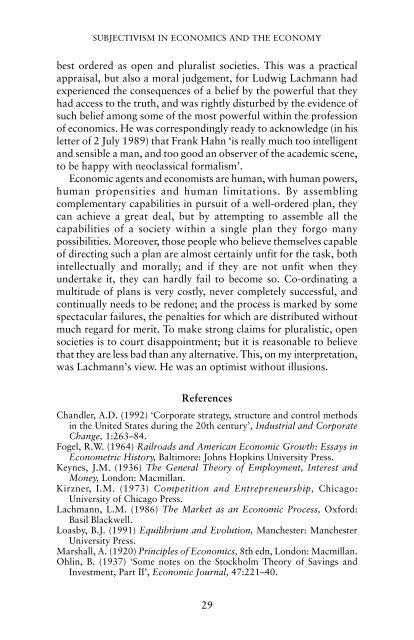Subjectivism and Economic Analysis: Essays in memory of Ludwig ...
Subjectivism and Economic Analysis: Essays in memory of Ludwig ...
Subjectivism and Economic Analysis: Essays in memory of Ludwig ...
You also want an ePaper? Increase the reach of your titles
YUMPU automatically turns print PDFs into web optimized ePapers that Google loves.
SUBJECTIVISM IN ECONOMICS AND THE ECONOMYbest ordered as open <strong>and</strong> pluralist societies. This was a practicalappraisal, but also a moral judgement, for <strong>Ludwig</strong> Lachmann hadexperienced the consequences <strong>of</strong> a belief by the powerful that theyhad access to the truth, <strong>and</strong> was rightly disturbed by the evidence <strong>of</strong>such belief among some <strong>of</strong> the most powerful with<strong>in</strong> the pr<strong>of</strong>ession<strong>of</strong> economics. He was correspond<strong>in</strong>gly ready to acknowledge (<strong>in</strong> hisletter <strong>of</strong> 2 July 1989) that Frank Hahn ‘is really much too <strong>in</strong>telligent<strong>and</strong> sensible a man, <strong>and</strong> too good an observer <strong>of</strong> the academic scene,to be happy with neoclassical formalism’.<strong>Economic</strong> agents <strong>and</strong> economists are human, with human powers,human propensities <strong>and</strong> human limitations. By assembl<strong>in</strong>gcomplementary capabilities <strong>in</strong> pursuit <strong>of</strong> a well-ordered plan, theycan achieve a great deal, but by attempt<strong>in</strong>g to assemble all thecapabilities <strong>of</strong> a society with<strong>in</strong> a s<strong>in</strong>gle plan they forgo manypossibilities. Moreover, those people who believe themselves capable<strong>of</strong> direct<strong>in</strong>g such a plan are almost certa<strong>in</strong>ly unfit for the task, both<strong>in</strong>tellectually <strong>and</strong> morally; <strong>and</strong> if they are not unfit when theyundertake it, they can hardly fail to become so. Co-ord<strong>in</strong>at<strong>in</strong>g amultitude <strong>of</strong> plans is very costly, never completely successful, <strong>and</strong>cont<strong>in</strong>ually needs to be redone; <strong>and</strong> the process is marked by somespectacular failures, the penalties for which are distributed withoutmuch regard for merit. To make strong claims for pluralistic, opensocieties is to court disappo<strong>in</strong>tment; but it is reasonable to believethat they are less bad than any alternative. This, on my <strong>in</strong>terpretation,was Lachmann’s view. He was an optimist without illusions.ReferencesCh<strong>and</strong>ler, A.D. (1992) ‘Corporate strategy, structure <strong>and</strong> control methods<strong>in</strong> the United States dur<strong>in</strong>g the 20th century’, Industrial <strong>and</strong> CorporateChange, 1:263–84.Fogel, R.W. (1964) Railroads <strong>and</strong> American <strong>Economic</strong> Growth: <strong>Essays</strong> <strong>in</strong>Econometric History, Baltimore: Johns Hopk<strong>in</strong>s University Press.Keynes, J.M. (1936) The General Theory <strong>of</strong> Employment, Interest <strong>and</strong>Money, London: Macmillan.Kirzner, I.M. (1973) Competition <strong>and</strong> Entrepreneurship, Chicago:University <strong>of</strong> Chicago Press.Lachmann, L.M. (1986) The Market as an <strong>Economic</strong> Process, Oxford:Basil Blackwell.Loasby, B.J. (1991) Equilibrium <strong>and</strong> Evolution, Manchester: ManchesterUniversity Press.Marshall, A. (1920) Pr<strong>in</strong>ciples <strong>of</strong> <strong>Economic</strong>s, 8th edn, London: Macmillan.Ohl<strong>in</strong>, B. (1937) ‘Some notes on the Stockholm Theory <strong>of</strong> Sav<strong>in</strong>gs <strong>and</strong>Investment, Part II’, <strong>Economic</strong> Journal, 47:221–40.29

















